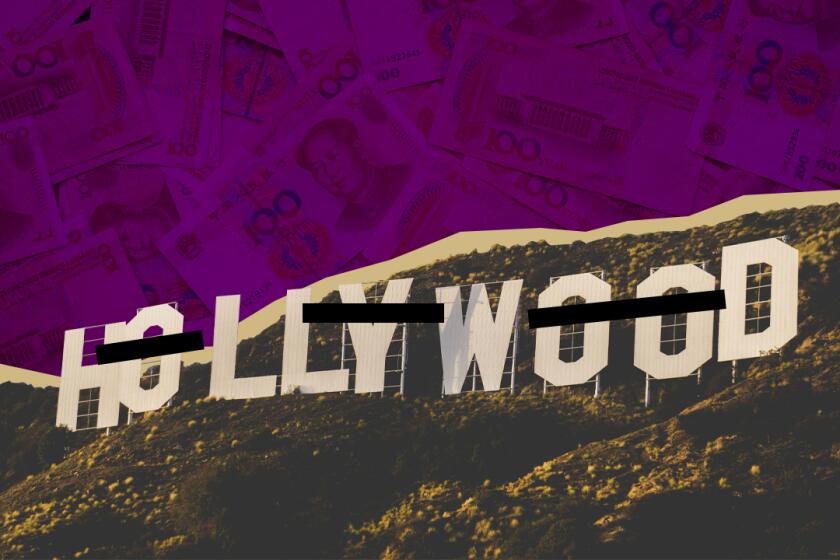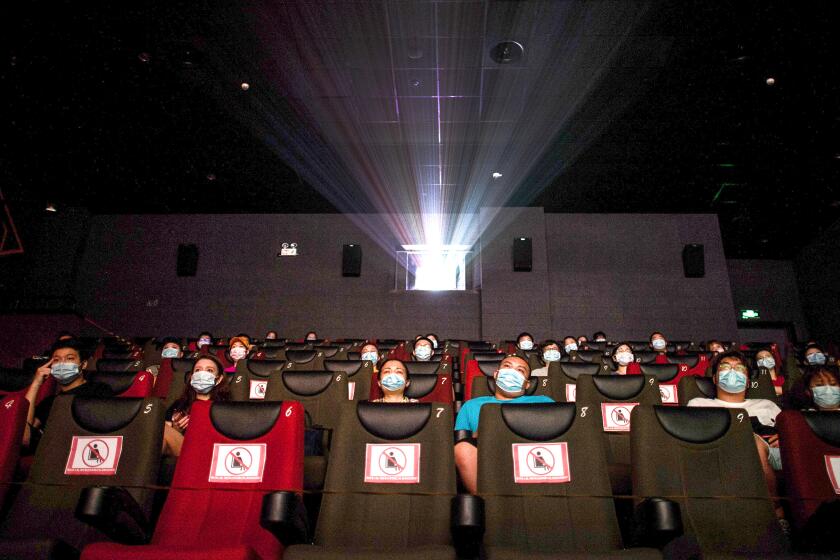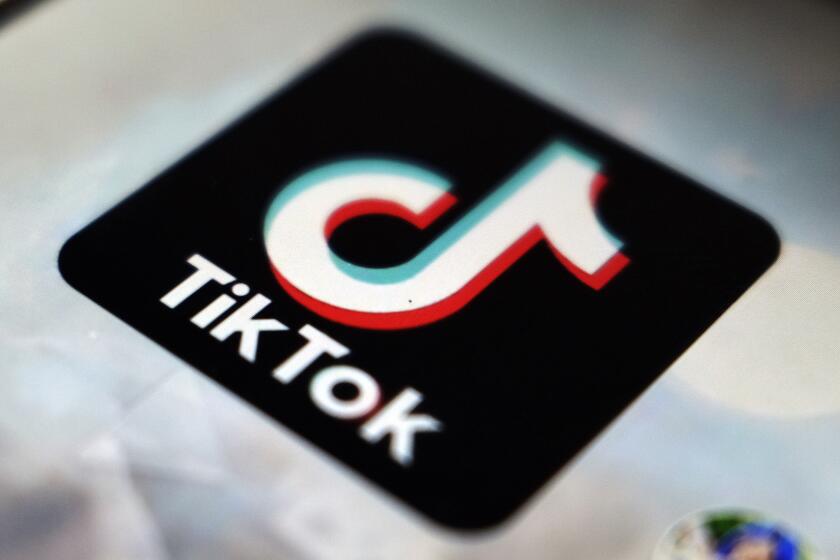Trump tariffs are another nail in the coffin for Hollywood in China

- Share via
- After Trump threatened this week to increase tariffs on China, Beijing’s Ministry of Commerce said it would ‘fight to the end.’ Two influential Chinese bloggers gave a preview of actions that Xi Jinping’s government was considering, including a ban on Hollywood movies.
- Such a move would haul entertainment companies to the front lines of the trade war. The prospect of losing access to China’s huge film market comes as U.S. studios have been trying to dig out of financial holes created by debt, the COVID-19 pandemic, Hollywood labor strikes and overspending during the streaming wars.
President Trump’s escalating trade tensions could bring an abrupt end to Hollywood’s ambitions in China.
After Trump threatened this week to increase tariffs on the world’s second-most populous country, Beijing’s Ministry of Commerce said it would “fight to the end.” Two influential Chinese bloggers on Tuesday gave a preview of actions that Xi Jinping’s government was considering, including a ban on Hollywood movies, according to Bloomberg News.
Such a move would haul the major entertainment companies to the front lines of the trade war. The prospect of losing access to China’s huge film market comes as U.S.-based studios have been trying to dig themselves out of financial holes created by merger debt, the COVID-19 pandemic, Hollywood labor strikes and a costly buildup of movies and TV shows to stock streaming services to compete with Netflix.
Studios were already struggling to preserve traction for their films in China as that nation prioritized its homegrown productions.
“They’re trying to beat Hollywood,” said Stanley Rosen, a USC political science professor who specializes in U.S.-China relations. “This is becoming a patriotic issue [for China] as well as an economic issue.”
In recent years, U.S. studios struggled against an increasingly robust slate of Chinese movies with culturally appealing themes. China’s film industry has become adept at churning out movies with high production values and support from the Chinese Communist Party, leaving less room for English-language features that once did blockbuster business in the market.
U.S. entertainment companies chased short-term profits while China’s propaganda apparatus played the long game. Guess who won.
One bright spot came this last week when the Warner Bros. and Legendary Pictures-produced “A Minecraft Movie” topped the charts in China. The film, based on a popular video game starring Jason Momoa and Jack Black, took in $15 million in China. It unseated “Ne Zha 2,” a homegrown animated feature that has grossed more than $2 billion.
“A Minecraft Movie” is just a wisp of past glories.
Two decades ago, Hollywood studios viewed the so-called Middle Kingdom as a vast market to exploit. Filmmakers altered storylines and added prominent Chinese symbols and backdrops to win the approval of government censors and Chinese moviegoers. In one dramatic example, MGM in 2011 digitally scrubbed a remake of the movie “Red Dawn” to delete all traces of Chinese villains. Instead, the movie’s bad guys hailed from North Korea, where there was no film market.
Hollywood reaped handsome rewards — for a while.
Walt Disney Co.’s hit 2019 Marvel film “Avengers: Endgame” made more than $600 million in China.
That same year, Paramount Pictures released an early trailer for “Top Gun: Maverick,” with a slight wardrobe change for Tom Cruise’s famed fighter pilot. In the original 1986 film, Cruise’s swaggering Capt. Pete “Maverick” Mitchell wore a bomber jacket festooned with flags of Japan and Taiwan. But those symbols were deemed too politically sensitive for China.
In the 2019 trailer, Maverick’s jacket patches were ambiguous. But China still refused to allow the movie, which celebrates U.S. military might.
China’s Tencent Holdings, which is an investor in “Top Gun: Maverick” co-producer Skydance Media, reportedly backed out of the project. When the movie was released in 2022, Maverick’s Japanese and Taiwanese flags were back.
China, the world’s largest box office, is using its market power to influence Hollywood and project the Communist Party’s voice.
Film executives this week said that breaking into the China market has become so tenuous that they no longer count on possible Chinese revenue when drawing up production budgets.
Despite the challenges, two American films released last year in China managed to surpass $100 million in ticket sales, Rosen said: Disney’s “Alien: Romulus” ($110 million in China) and Warner Bros.’ “Godzilla x Kong: The New Empire” ($132 million).
This year, China’s biggest films have been local productions. “Ne Zha 2” is one of the top-grossing movies of all time. It also made a respectable splash in the U.S., where it has garnered $21 million, including on Imax screens, according to Box Office Mojo.
When the U.S. and China struck a landmark deal in 2012 to pry open the Asian country’s vast film market, Hollywood salivated.
Even if China doesn’t ban all Hollywood films, experts predict a dramatic slowdown.
“For those films [the Chinese government] might accept, they’re not going to promote them,” Rosen said.
U.S. entertainment companies have been bracing for additional fallout from the global trade war.
Economists and prominent bankers, including JPMorgan Chase Chief Executive Jamie Dimon, have warned that the Trump tariffs could produce lasting disruptive consequences, including prolonged inflation and a possible recession.
The U.S. film business still needs China. Does China need American movies?
Entertainment stocks have been hammered, along with the rest of the market, since Trump unveiled the tariffs during his “Liberation Day” speech.
Walt Disney Co. and Warner Bros. Discovery have been roughed up. Disney is down about 15% this month, while Warner Bros. Discovery has lost nearly a quarter of its value.
“Disney’s parks and experiences generate most of its profit. A recession would likely depress tourism and reduce attendance at Disney’s parks,” Morningstar analyst Matthew Dolgin wrote in a note to clients last week. “Disney is at risk of less international tourism to the U.S., particularly from Canada, due to chilled foreign relations.”
Warner Bros. Discovery has been trying to tame the more than $40 billion in debt it took on when it acquired HBO, CNN and the Burbank-based “Barbie” studio three years ago.
“Many stocks of highly leveraged firms are weak, perhaps on fears of tightening credit,” Dolgin wrote.
Analysts said there could be a pullback in television advertising amid fears of a possible recession. That market, which enters its key “upfront” sales period next month in New York, has already been wobbly after Netflix and Amazon‘s Prime Video jumped into the advertising market previously dominated by traditional TV networks. Cable channels, which have been struggling to hold on to viewers amid cord-cutting, could get crushed further, analysts have said.
Theme park attendance could get slammed if consumers tighten their wallets. The tariffs come just a month before Comcast’s NBCUniversal plans to unveil its Epic Universe theme park in Orlando in a $6-billion bet on Florida tourism.
TikTok gets another last-minute reprieve ahead of an April 5 deadline to sell itself or face a nationwide ban in the U.S.
Foreign deal-making has already taken a hit. Last week, the White House said the proposed sale of the popular TikTok app to American investors from China’s ByteDance had been delayed amid the trade skirmishes.
Fears over national security prompted Congress last year to pass a law, signed by former President Biden, to ban the app in the U.S. unless ByteDance agreed to divest. The law was set to kick in Jan. 19, but among his first moves, Trump extended the deadline.
Last week, the president signed another order, allowing TikTok to continue to operate for an additional 75 days.
In a silver lining for U.S. entertainment production, a softer U.S. dollar could make it more expensive to film overseas, including in Europe, which has been attracting film and TV shoots for years. Currency weakness could encourage studios to bring their productions back to the U.S., although perhaps not in Los Angeles, where the cost of labor is high, said media executives who weren’t authorized to comment.















